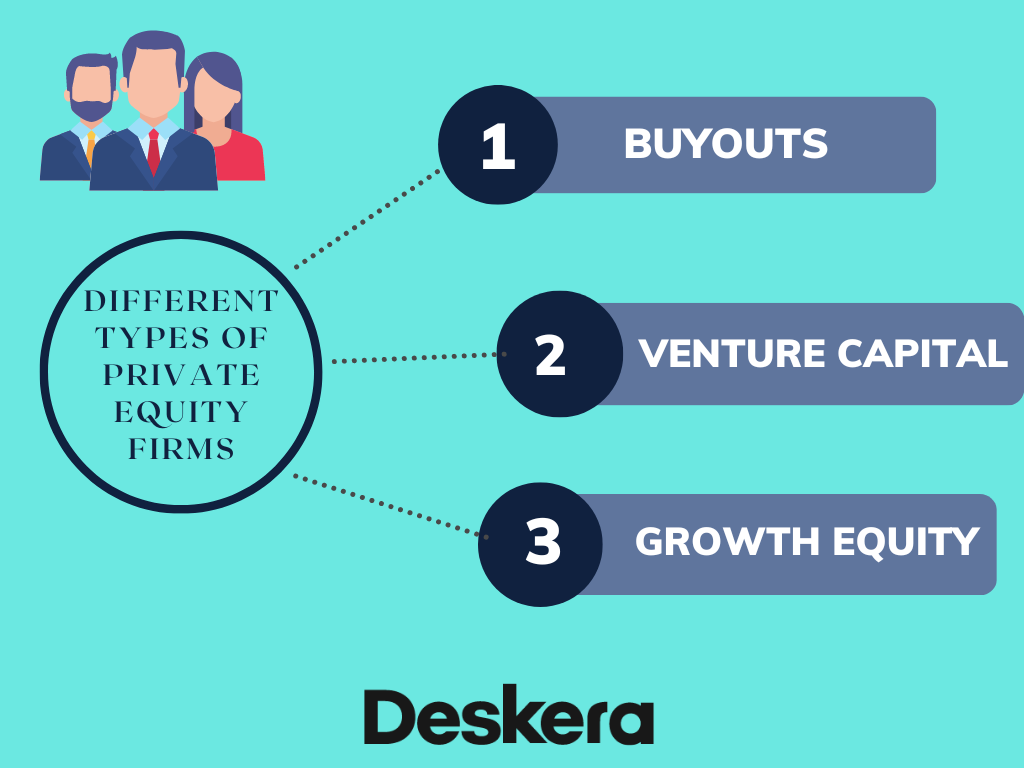Private equity is a type of capital that is used to invest in businesses outside of the traditional banking system. Further, private equity firms are typically comprised of financial investors and high-net-worth individuals (often referred to as "angels"). These investors use their resources to provide funding for a business venture, often in exchange for a share of the company's ownership.
Private equity is a valuable tool for businesses and individuals who want to get ahead in today's economy. It allows people with money and experience to invest in high-growth businesses. This can help entrepreneurs achieve their goals more quickly and efficiently.
If you're interested in private equity, it's important to understand the basics before getting started. Learning about these investments can help you make informed decisions that will benefit your financial future.
Let's take a look at the table of content that we'll discuss in this detailed guide:
- Private Equity (PE): What is it?
- Understanding Private Equity
- Private Equity History
- Working of Private Equity
- Private Equity Firm: What is it?
- Different Types of Private Equity Firms
- Top Strategies that You Must Follow for Private Equity Investments
- How do Private Equity Firms Generate Funds to Invest?
- Some Important Examples of Private Equity Firms
- Specialties of Private Equity
- Private Equity Fund: What is it?
- Grouping Private Equity: According to the Stage and Type of Financing of Portfolio Companies
- How Private Equity (PE) Creates Value?
- What are the Careers in Private Equity?
- Getting Started in Private Equity
- Frequently Asked Questions (FAQs) Associated with Private Equity (PE)
- Bottom Line
- How Deskera Can Assist You?
Let's get started!
Private Equity (PE): What is it?
Private equity is a sort of investment that is not regulated by the government and is not publicly traded on the stock market. It is typically used to invest in companies that are not publicly listed and is made up of capital from private investors, such as venture capitalists, high net worth individuals and institutional investors.

Private equity funds typically invest in companies that are in need of capital to expand their operations and/or to restructure their finances. Further, private equity funds often use debt financing, and they may also provide management expertise to help their portfolio companies reach their business goals.
Moreover, private equity investments can provide a company with the capital it needs to grow and can also help the company become more competitive in its industry.
Furthermore, it can also help a company increase its market share, develop new products and services, and access new markets. Additionally, it also helps in company reposition itself in its market, acquire other companies, and improve its overall financial performance.
Understanding Private Equity
Contrary to venture capital, private equity corporations and funds often invest in established businesses rather than start-ups. They manage the portfolio firms to raise or decrease value until they decide to quit investing years later.
Since 2000, the private equity industry has experienced tremendous expansion as a result of increased allocations to alternative investments and generally favorable returns on private equity funds.
Private equity buyouts more than doubled from 2020 to a record high of $1.1 trillion in 2021.
Private equity investing tends to be more attractive and well-liked when stock markets are flying and interest rates are low, and less so when those cyclical factors become unfavorable.
With the assistance of client funds, private equity firms establish private equity funds, manage them as general partners. And they also care after the fund assets in exchange for fees and a portion of earnings above a threshold (the hurdle rate).
Private equity investments have a limited lifespan of seven to ten years after the first investment and cannot be withdrawn again.
The funds do often begin rewarding their investors after a few years. The average ownership duration for a private equity portfolio business in 2021 was close to five years.
After Blackstone Group Inc.'s (BX) historic initial public offering (IPO) in 2007, a number of the biggest private equity firms went public, becoming publicly traded businesses.
In addition to Blackstone, other companies with shares that are traded on American exchanges include Carlyle Group Inc. (CG), KKR & Co. Inc. (KKR), and Apollo Global Management Inc. (APO). A few smaller private equity firms have also gone public via IPOs, the majority of which were located in Europe.
Private Equity History
One of the first corporate purchases and one of the greatest in terms of market and economic significance was the purchase of Carnegie Steel Corporation by J.P. Morgan for $480 million in 1901. It further followed by the merging of that business with Federal Steel Company and National Tube to become U.S. Steel.
Henry Ford bought out his partners in 1919 using primarily borrowed funds after being sued by them for reducing dividend payments to finance for the construction of a new auto plant.
The largest leveraged buyout in history, RJR Nabisco was acquired by KKR for $25 billion in 1989 after accounting for inflation.
Working of Private Equity
Private equity investors build funds by pooling the money from limited partners (LPs) to invest in businesses. Once they reach their fundraising target, they shut the fund and invest the money in promising companies.
Furthermore, PE investors might make an investment in a firm that is struggling or stagnating but still has room to develop.
A PE firm typically makes money and pays out returns to LPs who invested in its fund when it sells one of the businesses in its portfolio to another business or investor. Some of the businesses backed by PE might eventually go public.
Private Equity Firm: What is it?
Private equity firms are the organizations that manage PE investments. They are responsible for providing capital to businesses, as well as providing advice and guidance on financial and operational matters.
Furthermore, private equity firms typically take an active role in the businesses that they invest in and have a vested interest in the success of the companies.

These businesses often employ a staff of experts with a variety of specialties, including investment banking, operations, and law.
Moreover, private equity firms may cling onto companies for a number of years because they often concentrate on long-term investments. These firms also typically use leverage to increase their returns on investments. This means they will borrow money to purchase a company and then use the company’s assets as collateral for the loan.
The private equity firm then uses the borrowed money to increase the returns on the investment. Generally, these firms typically focus on creating value for their portfolio companies through operational improvements and strategic investments, rather than simply buying and selling companies.
Private equity firms may focus on a certain sector, such as real estate, technology, or the healthcare sector. There are limited partners and general partners inside the corporation itself:
- The limited partners include of pension funds, institutional investors, and private investors. Limited partners aren't allowed to experience a loss greater than their initial investment, despite owning the majority of the fund's shares.
- General partners or the corporation as a whole decide where, when, and how limited partner cash is invested. General Partners are accountable for the full loss if their investment decisions are unsuccessful, although owning just a small percentage of the fund.
Different Types of Private Equity Firms
Private equity strategy can be divided into three main subcategories:
- Buyouts,
- Growth Equity, and
- Venture Capital

Even though they are not in direct competition with one another, and each requires a unique set of skills to be successful, each of these strategies has a place in the life cycle of an organization.
Following, we’ve discussed in detailed look at each private equity strategy to assist you in creating portfolios.
1. Buyouts
The primary private equity strategy and the one that has advanced the most over the course of the company's existence is buyouts. Buyouts occur when an established, typically publicly traded firm is taken private and purchased by the current management team or a private equity group. This type of investment receives the majority of the funds utilized for private equity investments.
When a buyout takes place, all of the company's former investors sell their shares and withdraw. The management team or private equity firm is required to be the only investor and to hold a controlling interest in the company (more than 50 percent).
There are two sorts of buyouts:
- Management Buyout: In a management buyout, the company's present management team buys the business's assets and gains a majority stake.
- Leveraged Buyout: Buyouts that are financed using borrowed money are referred to as leveraged buyouts.
Management Buyout
Management buyouts could be a smart choice if a publicly traded firm needs internal restructuring and wants to go private before implementing organizational changes.
All stockholders and investors are able to do so prior to the change in management. The management team might receive financial assistance from a private equity firm that would accept a small equity stake in the company in exchange for funding. For business owners, it can also be used as a retirement strategy.
Despite what the name might suggest, a management buyout is not the same as a management buy-in, which occurs when the management team of another company purchases the business and assumes ownership and managerial responsibility. Even while the term can be used to apply to any kind of takeover, this is typically referred to as an acquisition.
Leveraged Buyouts
For businesses that want to make sizable acquisitions without investing a lot of money, leveraged buyouts would make sense. Loans used to finance the buyout are secured by the assets of both the acquiring and the acquired businesses.
The 2006 acquisition of Hospital Corporation of America by private equity companies KKR, Bain & Company, and Merrill Lynch is a great illustration of a leveraged buyout.
Any buyout seeks to transfer control of the business while it undergoes internal development, with the hope that those advancements would generate a profit to cover the cost of the buyout.
Buyouts represent a significant risk, much like venture capital and growth equity, but they can be able to assist a company in restructuring and starting anew for amazing growth.
2. Venture Capital
A type of private equity funding known as venture capital is given by investors to start-up enterprises and small businesses. It runs with the expectation that they will grow significantly over the long term. Rich investors, investment banks, and other financial institutions are the usual sources.
Venture capital investments can take the form of debt financing, where the venture capital firm lends money to the company, or equity financing, where the venture capital firm buys a stake in the company. Typically, venture capital investments are made in exchange for the potential of a high return if the company succeeds.
Furthermore, these investments can be used to fund research and development; expand production capacity; finance marketing and sales efforts; acquire other companies; and provide working capital. The venture capital firm often offers experience and direction in addition to funding.
Additionally, venture capital investments are generally made in high-growth industries. It includes technology, biotechnology, and healthcare. The venture capital firm typically takes an active role in the company's decisions, helping to shape its strategy and providing advice on operations and management.
However, venture capital investments can also be risky. It is because if the company does not perform as expected, the venture capital firm may not see a return on its investment.
Ultimately, this kind of investments typically have a longer time horizon than other types of investments. Therefore, it takes time to realize a return could be significantly longer than other investments.
Remember that venture capital investments are usually less liquid than other investments and may require more active management from the investor.
3. Growth Equity
Growth equity is a type of private equity investment that is used to finance the expansion of established companies. It involves taking a minority stake in a business in exchange for capital. The capital is used to fund new initiatives, such as marketing campaigns, product development, and hiring new staff.
Growth equity can also provide access to expertise and connections that can help a company scale and become more successful. It is often used in conjunction with venture capital to provide a more comprehensive strategy for helping a business grow.
Many companies that invest in growth equity track the financial information of startup companies over time, frequently for up to 10 or 15 years. This makes it possible for firms to identify those who are making money and expanding swiftly and contact them when it appears that they need funding to continue expanding.
Furthermore, growth equity investors frequently anticipate the company to have a growth plan in order to effectively forecast the return on investment. If a business needs equity money for expansion, it can justify the requirement by citing the need to hire more employees, lease more office or retail space, or buy new production equipment to keep up with demand.
A good eye for a talented founder or team, as well as comprehensive, deliberate study, financial analysis, and projection, are necessary for growth stock buying.
Top Strategies that You Must Follow for Private Equity Investments
Following we've discussed some crucial strategies that you must follow when it comes to private equity Investments:
- Identify Target Companies: The first step in any private equity investment strategy is to identify target companies. This process involves researching potential investments in order to identify companies that offer strong growth potential and are attractive to investors. Private equity investors typically focus on businesses with high growth potential in attractive markets.
- Conduct Due Diligence: Private equity investors must conduct due diligence to assess the value of the target company and determine if it is a good fit for the investor’s portfolio. This includes evaluating the company’s financials, competitive environment, customer base, and management team.
- Negotiate Terms: After conducting due diligence, private equity investors must negotiate the terms of the investment. This includes the purchase price, the structure of the deal, the percentage of ownership, and the expected returns.
- Monitor Performance: Private equity investments require ongoing monitoring and management in order to ensure that the investment is performing as expected. Private equity investors must monitor the performance of their investments, work with management teams to drive growth, and identify opportunities for value creation.
- Exit Strategy: Private equity investors must develop an exit strategy to maximize returns. The most common exit strategies are public offering, sale to another investor, or recapitalization. The strategy should be developed based on the company's growth prospects and the investor's goals. Additionally, investors should consider the tax implications of each exit strategy, as well as any regulatory or legal considerations.
How do Private Equity Firms Generate Funds to Invest?
The enterprises receive funding from a number of sources to make these changes. As limited partners, endowments, independent wealth funds, and individual investors are all acceptable. However, pension plans, particularly public pension systems, account for a sizable share of the capital for private equity funds.
These public pension funds invest in private equity to assure that beneficiaries will be paid because many public pension systems are underfunded. As of November 2021, state pension systems provided about half of the funding for the member companies of the National Association of Investing Companies.
PE funds obtain management and performance fees. The 2-and-20 rule is typically followed by fee structures, though they may differ from fund to fund.
Management Fees
It is often close to 2% when expressed as a proportion of assets under management, or AUM. These costs are recurring and are intended to cover overhead and ongoing expenses.
Performance Fees
When represented as a percentage of assets under management, or AUM, it is frequently very close to 2%. These recurring payments are used to cover ongoing expenses and overhead.
Some Important Examples of Private Equity Firms
Following, we've discussed some important examples of private equity (PE) firms. Let's learn:
The Carlyle Group
The Carlyle Group is a corporate development and private equity company with its main headquarters in Washington, DC, that focuses on a number of industries. In its current portfolio, X-Chem, Vault Health, and Memsource are just a handful of the businesses.
The Blackstone Group
The Blackstone Group is a financial institution that makes investments in real estate, private equity, and other industries. Its headquarters are in New York. One of Blackstone's portfolio firms is Change Healthcare, along with Service King and Optiv.
TPG Capital
TPG Capital is a worldwide corporation based in San Francisco. Its current portfolio companies include Reading International, Greencross, and Wind River Systems.
Specialties of Private Equity
One specific form of private equity investment is the only focus of some private equity funds and companies.
Even while venture capital is sometimes referred to as a subset of private equity, its distinct function and skill set it apart and prompted the formation of specialized venture capital firms that now dominate their sector.
Other areas of private equity competence include:
- Focusing on financially unstable enterprises and investing in distressed conditions
- Growth equity, which invests in expanding companies after they pass the startup stage, is a field in which certain private equity firms specialise solely—for example, in energy or technology ventures.
- Secondary buyouts, in which ownership of a firm is transferred from one private equity group to another, and Carve-outs, in which business units or subsidiaries are bought.
Private Equity Fund: What is it?
A private equity fund is a type of investment fund that pools capital from high-net-worth investors and institutional investors for the purpose of investing in private equity investments, such as venture capital, leveraged buyouts, and distressed securities.
The purpose of a private equity fund is to generate a return on the investments made by the fund managers. Private equity funds typically have a life span of several years and can range in size from a few million dollars to billions of dollars.

Private equity funds can provide capital for a variety of purposes, including start-up financing, the purchase of existing businesses, recapitalization, and the acquisition of minority ownership interests.
Furthermore, private equity funds are often managed by experienced investment professionals who are charged with finding, assessing, and making investments in companies that have the potential to produce attractive returns.
Check the following differences to avoid any confusion:
PE Funds vs. Hedge Funds
Alternative investments include hedge funds and private equity funds (PE Funds). Private Equity Funds invest in companies, often taking an ownership stake, in order to make them more profitable.
Hedge Funds also take an ownership stake in companies but focus more on short-term profits by taking advantage of market volatility. They employ a range of tactics, including short-selling, derivatives, and leverage.
Private Equity Funds tend to be longer-term investments, with the goal of increasing a company’s value and potentially selling it for a profit. Hedge funds are often shorter-term investments that aim to profit quickly from market fluctuations.
PE Funds vs. Mutual funds
Private Equity Funds (PE Funds) and Mutual Funds are both types of investment funds. They differ in their structure, investments, and regulations.
Private equity funds (PE Funds) are investment funds that commonly use debt to finance the acquisition of private companies. These funds are typically only open to accredited investors and usually carry higher fees and higher minimum investments than mutual funds. PE Funds are highly illiquid, meaning it can take years or decades to return the investor’s capital.
Mutual Funds are investment funds that invest in a variety of publicly traded securities, such as stocks and bonds. They are open to all investors and have lower fees and minimum investments than PE Funds. Due to the high liquidity of mutual funds, investors may usually immediately access their money.
The Management of Private Equity Funds
A general partner (GP), typically the private equity firm that founded the fund, is in charge of managing a private equity fund. All choices about the management of the fund are made by the GP. To ensure that it has skin in the game, it also adds 1% to 3% of the fund's capital.
In exchange, the general partner (GP) receives a management fee that is typically fixed at 2% of the fund's assets, as well as the possibility of incentive compensation in the form of carried interest or 20% of fund gains beyond a specified threshold. Limited partners are the clients of the private equity firm who make investments in the fund; they are only partially liable.
Grouping Private Equity: According to the Stage and Type of Financing of Portfolio Companies
Following, we’ve grouped private equity according to stage, types and with its detailed description. Let’s check the table:
How Private Equity (PE) Creates Value?
Private equity (PE) creates value by providing capital to companies in exchange for equity. This capital can be used to finance acquisitions, fund new projects, hire new staff, and/or provide a cash infusion to help stabilize the business. This capital injection can help a business increase its revenue, expand its operations, and become more competitive in the marketplace.
PE investors are typically looking for high returns on their investments, and this often means that they are willing to take risks and invest in companies that may have difficulty obtaining traditional financing. PE investors also often bring expertise and experience to the table to help the company grow.
Additionally, PE firms often strive to add value to the companies they invest in by helping to restructure operations, improve efficiency, and develop strategic plans for long-term success.
Private equity (PE) companies carry out two vital tasks:
- Deal origination/transaction execution
- Portfolio oversight
In order to achieve both high-quantity and high-quality deal flow, deal origination entails cultivating and maintaining connections with investment banks, mergers and acquisitions (M&A) intermediaries, and other related transaction specialists.
Potential acquisition candidates are referred to PE professionals for investment review. Some companies use internal staff to actively seek out and get in touch with business owners in order to generate leads for transactions. Finding exclusive deals in a competitive M&A climate can assist ensure that collected funds are wisely allocated and used.
Deal origination requires building and maintaining relationships with investment banks, mergers and acquisitions (M&A) intermediaries, and other associated transaction professionals in order to achieve both high-quantity and high-quality deal flow.
Potential acquisition targets are recommended to PE specialists for investment consideration. Some companies use internal employees to actively find and get in touch with business owners in order to generate leads for transactions. In a competitive M&A environment, finding exclusive transactions can assist ensure that the funds raised are used and spent properly.
Investment banks frequently raise their own money; thus, they might submit a competitive offer in addition to referring a deal. In other words, certain investment banks compete with private equity (PE) firms when purchasing profitable enterprises.
The process of executing a transaction includes evaluating management, the industry, prior financial results and expectations, as well as conducting valuation analyses. After getting the go-ahead from the investment committee to explore a potential acquisition candidate, the deal professionals present a seller with an offer.
The deal specialists collaborate with a variety of transaction experts, such as investment bankers, accountants, lawyers, and consultants, to finish the due diligence phase if both parties opt to proceed. Due diligence includes verifying the management's reported operational and financial data.
Since consultants may uncover deal-breakers including significant liabilities and threats that weren't previously revealed, this stage of the process is critical.
What are the Careers in Private Equity?
You can work on a private equity company's investing side or behind the scenes in a more support-focused role.
Career Path for Investors in Private Equity:
1. Be an analyst or associate to begin your career in investment banking. This will give you exposure to a variety of industries, provide you with technical skills, and teach you the fundamentals of investment banking.
2. Consider a master's degree: Consider obtaining a master's degree in finance or economics. This will provide you with an in-depth knowledge of the financial markets and give you an edge when applying for private equity positions.
3. Move to a Hedge Fund: Consider a move to a hedge fund, which will give you experience in managing a portfolio and understanding the markets. You'll gain a better grasp of how private equity firms operate as a result of this.
4. Get an Internship in Private Equity: Consider getting an internship with a private equity firm. This will give you an inside look at how private equity works and will provide you with valuable experience.
5. Take a Position in Private Equity: Once you have obtained the necessary experience, you can apply for a position in private equity. This may be a junior position, such as an analyst, but it will provide you with the opportunity to develop your skills and learn the ropes of private equity.
6. Progress to a Senior Role: As you gain experience and prove yourself, you may be promoted to a more senior role within the private equity firm. This could involve leading investments, managing portfolios, and/or assessing potential investments.
7. Develop Your Network: While working in private equity, it is important to expand your network and connect with other professionals in the industry. This will help you to make valuable connections and establish yourself as an expert in the field.
8. Look for Other Opportunities: As you gain more experience, you may look to other opportunities outside of private equity. This could include venture capital, hedge funds, or even starting your own firm.
Support Careers in Private Equity
A private equity firm needs employees to run the company and staff its offices, just like any large organization does. These responsibilities include the following:
- Accountants
- Attorneys,
- Administrative support personnel,
- Data scientists, and
- Human resources
Getting Started in Private Equity
The private equity industry is competitive, and employers typically favor candidates with an MBA or a master's degree in finance.

Working as an investment banker for a few years is a common way to break into the private equity industry. The abilities needed for private equity are directly transferable to much of the daily work in investment banking.
Many professionals in the finance sector want to work in private equity. And for good reason—these companies don't deal in cents, and their high-value transactions usually result in big salaries and incentives.
Furthermore, private equity deals are getting bigger and bigger. Private equity buyouts reached a total of $1.1 trillion in 2021, which is double the amount from the previous year, according to a Bain & Company report. To succeed in private equity, you must ultimately possess the remarkable talents. It inlcudes:
- Analytical and Problem-Solving Skills: Private equity professionals must be able to analyze large amounts of data, identify trends and develop creative solutions to problems.
- Business Acumen: Private equity professionals must have a thorough understanding of the financial markets and the ability to make sound investment decisions.
- Communication Skills: Private equity professionals must be able to effectively communicate complex financial concepts to a broad range of people.
- Interpersonal Skills: Private equity professionals must be able to interact well with a variety of people, including partners, investors, clients, and other professionals.
- Leadership Skills: Private equity professionals need strong leadership skills to effectively manage their team and ensure the success of their investments.
- Negotiation Skills: Private equity professionals must be able to negotiate complex deals and agreements with other parties.
- Skills in Risk Management: Private equity professionals need to be able to identify risks and formulate countermeasures for them.
Frequently Asked Questions (FAQs) Associated with Private Equity (PE)
Following, we've discussed some crucial and common questions that would pop up in your mind linked with private equity, Let's learn them:
Que 1: Private Equity Vs Crowdfunding
Answer: Check the following difference between private equity and crowdfunding. Let's learn:
Private Equity
Private equity is a type of investment where investors lend money to privately held businesses. Private equity investors typically purchase a stake in a company and become active in its management, hoping to improve the company’s operations and profits and eventually sell their stake for a profit.
Private equity investments are typically longer-term than traditional investments, with the investors typically holding their equity stake for several years. The investments are also typically larger, with the investors investing more money in exchange for a larger stake in the company.
Crowdfunding
Crowdfunding is a form of fundraising in which people or groups of people pool their money together to invest in a project, company, or venture. Crowdfunding allows individuals to pool their resources to support a project or venture that they believe in, often with the expectation of a return on their investment.
Unlike private equity investments, crowdfunding is typically a shorter-term form of investment, with investors typically expecting to receive their investment back within a few months or years. Crowdfunding also tends to be a smaller form of investment, with investors typically investing smaller amounts of money than they would in a private equity investment.
Que 2: Private Equity Vs Venture Capital?
Answer: Private Equity and Venture Capital are two forms of investing that are similar in many ways but have some important differences.
Private Equity is the purchase of a company or a portion of a company, usually with the intention of improving the performance of the company, and then exiting the investment at a later date. Moreover, these firms often provide capital to companies that are in need of restructuring, or companies that need capital to fund expansion plans. Private Equity investments are usually quite large and are typically made by institutional investors or wealthy individuals.
On the other hand, venture Capital is a form of financing usually provided to early-stage companies with the goal of helping them grow and become more successful as a business.
Furthermore, venture capital investments are usually smaller than Private Equity investments and are typically provided to companies that have potential for high growth but are not yet mature enough to attract larger investments. Investors in venture capital companies often have a long-term perspective and aim to profit from the company's success.
The quantity and nature of the investments that each provides distinguish private equity from venture capital as a whole.
Private Equity investments tend to be much larger and are generally made by institutional investors or wealthy individuals, while Venture Capital investments are smaller and typically provided to companies in the early stages of development.
Private Equity investments are also typically longer-term investments, while Venture Capital investments are typically shorter-term investments, looking to exit after a few years. While Venture Capital investments are often made in start-ups or early-stage businesses, Private Equity investments are typically made in more established businesses.
Investments in or ownership of privately held businesses are referred to as private equity. Additionally, it alludes to the PE investment approach. An example of a PE investment is venture capital, which mostly supports startups. A portion of venture capital is known as private equity.
Here are some further variations between PE and VC.
Private Equity Characteristics:
- PE corporations usually make investments in well-established businesses in traditional industries.
- Using funds pledged by LPs, PE investors make investments in promising businesses, frequently attaining a majority stake (>50%).
- The PE investors and the LPs receive profits when a PE firm sells one of the portfolio companies it owns to another business or investor. LPs usually get 80% of the profits, while investors only get 20%.
Venture Capital Characteristics:
- Tech-focused startups as well as other startups are typically seed-funded by VC firms.
- When VC investors use committed funds to invest in a company, they typically acquire a minority stake (50%) in that company.
- Because the bulk of these enterprises are not yet fully established or successful, they can be risky investments, but that risk also offers a chance for substantial gains.
- If the company in which it has invested becomes public, is bought out, or has some of its shares sold to another investor on the secondary market, the firm will profit.
Que 3: Private Equity Investor: What is it?
Answer: Private equity investors lend money to businesses in return for a share of the company's equity or ownership, generally through a private placement. These investors are typically venture capitalists, private equity firms, angel investors, institutional investors, and/or family offices.
Furthermore, private equity investors provide capital to companies that may not be able to access traditional forms of capital such as debt or equity through public markets.
This capital can come in the form of debt, equity, or a combination of both. The private equity investor will typically take a board seat or other form of active involvement in the company and take part in the decision-making process.
Private equity investors also often have a longer-term investment horizon, meaning they will typically look to exit the investment after a period of time, often within 5-10 years. During this period, the private equity investor will typically look to add value to the company and position the company for a successful exit.
In exchange for their capital, private equity investors will often look for a return on investment in the form of a dividend payment, sale of the company at a premium, or a combination of both.
Que 4: Oversight and Management?
Answer: Management and oversight are the second critical role for private equity (PE) specialists. They can assist the executive team of a young firm by teaching them best practices in financial management and strategic planning, among other things. To increase the return on their investment, they can also help with the institutionalization of new IT, procurement, and accounting techniques.
Private equity (PE) companies believe they have the skills necessary to acquire underperforming companies. It further helps in strengthening them by increasing operational efficiencies and, consequently, profitability, in larger, more established companies.
Although private equity (PE) firms also endeavor to create value by seeking to match corporate management's objectives with those of the company and its investors, this is the main way that private equity firms create value (PE).
By privatizing public enterprises, which exempts them from the constant public scrutiny of quarterly profitability and reporting obligations, private equity (PE) firms can undertake a longer-term strategy to improve the fortunes of the purchased firm.
Additionally, it is customary to add accountability and motivation to management's efforts by more closely tying compensation to the business' performance.
This, along with other strategies frequently used in the private equity (PE) sector, eventually result in a significant increase in the acquired company's valuation from the time it was purchased, resulting in a successful exit strategy for the PE firm—whether that's a resale, an initial public offering (IPO), or another option.
Que 5: Deals in Private Equity?
Answer: The transactions that private equity firms carry out to buy and sell their portfolio companies can be divided into categories based on their specific conditions.
Private equity deals sometimes involve the buyout, which involves the acquisition of a whole business, whether it is publicly traded, closely owned, or privately held. Private equity investors usually look for cost-cutting opportunities and may restructure the business when purchasing a faltering public company.
In a separate type of private equity acquisition known as a "carve-out," investors purchase a non-core division of a larger company that has been placed up for sale by its parent company.
Examples include the agreement between Francisco Partners and German software juggernaut SAP SE (SAP) to buy corporate training platform Litmos, announced in August 2022, and Carlyle's 2014 purchase of Tyco Fire & Security Services Korea Co. Ltd. from Tyco International Ltd.
Despite being more challenging and hazardous, carve-outs sometimes have lower value multiples than comparable private equity acquisitions.
In a secondary buyout, a private equity firm will acquire a business from another private equity group rather than buying a publicly traded company. Previously seen as crisis sales, these transactions are now more commonplace as private equity firms become more specialized.
A corporation might, for instance, buy a company to cut costs before selling it to another PE partnership looking for a platform to buy similar companies.
The portfolio firm's IPO and sale to a rival company are two other private equity investment exit strategies.
Que 6: Private Equity Firms: Are they Governed?
Answer: Private equity funds are not subject to SEC regulation under the Investment Company Act of 1940 or the Securities Act of 1933, but their managers are nonetheless governed by the Investment Advisers Act of 1940 and the anti-fraud provisions of federal securities laws.
For private fund advisers, including private equity fund managers, the SEC proposed comprehensive new reporting and customer transparency requirements in February 2022.
The proposed rules would require private fund managers registered with the SEC to provide clients with quarterly statements explaining fund performance, fees, and expenses as well as yearly fund audits. It would be illegal for all fund advisors to provide a single consumer exceptional term in a financial vehicle without alerting the other fund investors.
Que 7: Reasons for Criticism of Private Equity?
Answer: By showcasing their managerial abilities and offering examples of successful portfolio business makeovers, private equity firms have fought back against the stereotype that they are corporate asset strip miners.
Many people applaud the environmental, social, and governance (ESG) standards, which oblige companies to take into account the interests of parties other than its owners.
However, the sudden changes that are typically part of a private equity buyout can be difficult for the staff of a firm and the communities in which it works.
Another issue that is frequently discussed is the carried interest provision, which allows private equity managers to pay most of their taxes at the lower capital gains tax rate. Attempts by Congress to tax that compensation as income have failed on multiple times, most notably when the Inflation Reduction Act of 2022 was amended to eliminate this amendment.
Bottom Line
For a large-scale organization, no type of ownership is free from the conflicts of interest caused by the agency problem. Similar to the management of publicly traded companies, private equity firms occasionally pursue goals that are different from those of other stakeholders, including limited partners.
Even nevertheless, the vast majority of private equity deals benefit the owners of the fund, and many of them improve the acquired company. In a market economy, if there is sufficient regulation, a company's owners are free to choose the capital structure that best suits their interests.
How Deskera Can Assist You?
Deskera's integrated financial planning tools allow investors to better plan their investments and track their progress. It can help investors make decisions faster and more accurately.

Deskera Books enables you to manage your accounts and finances more effectively. Maintain sound accounting practices by automating accounting operations such as billing, invoicing, and payment processing.
Deskera CRM is a strong solution that manages your sales and assists you in closing agreements quickly. It not only allows you to do critical duties such as lead generation via email, but it also provides you with a comprehensive view of your sales funnel.
Deskera People is a simple tool for taking control of your human resource management functions. The technology not only speeds up payroll processing but also allows you to manage all other activities such as overtime, benefits, bonuses, training programs, and much more. This is your chance to grow your business, increase earnings, and improve the efficiency of the entire production process.
Final Takeaways
We've arrived at the last section of this guide. Let's have a look at some of the most important points to remember:
- Private equity is a sort of investment that is not regulated by the government and is not publicly traded on the stock market. It is typically used to invest in companies that are not publicly listed and is made up of capital from private investors, such as venture capitalists, high net worth individuals and institutional investors.
- The limited partners include of pension funds, institutional investors, and private investors. Limited partners aren't allowed to experience a loss greater than their initial investment, despite owning the majority of the fund's shares.
- The primary private equity strategy and the one that has advanced the most over the course of the company's existence is buyouts.
- A type of private equity funding known as venture capital is given by investors to start-up enterprises and small businesses with the expectation that they will grow significantly over the long term.
- Growth equity is a type of private equity investment that is used to finance the expansion of established companies. It involves taking a minority stake in a business in exchange for capital.
- Deal origination requires building and maintaining relationships with investment banks, mergers and acquisitions (M&A) intermediaries, and other associated transaction professionals in order to achieve both high-quantity and high-quality deal flow.
Related Articles












